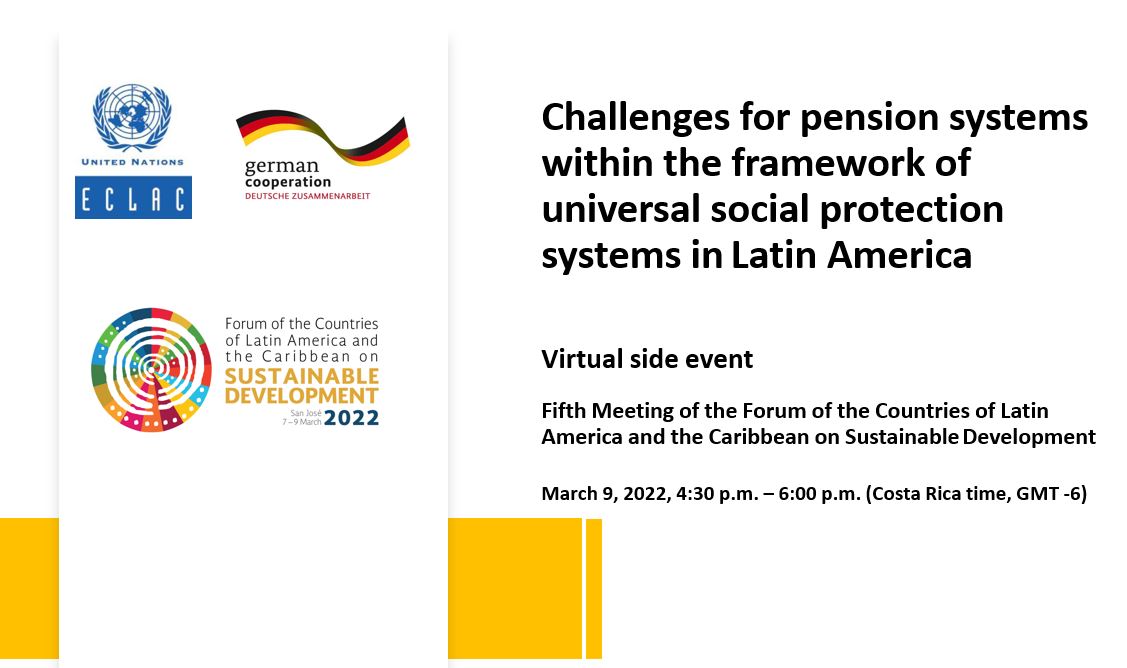Virtual side event: Challenges for pension systems within the framework of universal social protection systems in Latin America
Within the framework of the activities of the project "Transformative Reactivation: Overcoming the consequences of the COVID-19 pandemic in Latin America and the Caribbean", executed by ECLAC together with the Deutsche Gesellschaft für Internationale Zusammenarbeit (GIZ) and financed by the Federal Ministry for Economic Cooperation and Development (BMZ) of Germany, and the United Nations Development Account project “Strengthening Social Protection for Pandemic Responses: Identifying the Vulnerable, Aiding Recovery and Building Resilience", the event seeks to promote the exchange of experiences on the learning and challenges that the pandemic has shown in pension systems, with a view of progress towards strengthened welfare states and universal, comprehensive and sustainable social protection systems. In particular, the event addresses elements on the designs of these systems and their implications for the sustainability of their results and the priority aspects to be considered in reform processes to advance in pension systems guided by principles of social solidarity and gender equality.
Pension systems are a constitutive element of the universal social protection systems and welfare architectures of the countries, being decisive in the income security of millions of elderly people. As ECLAC has indicated, it is essential to consolidate sustainable pension systems from a triple perspective, coverage, sufficiency, and financial sustainability. In addition, centrally to the design of pension systems should be the consideration of social security principles, including social solidarity and gender equality.
The COVID-19 pandemic has had a profound impact on the population's levels of well-being. As a result of its social and economic impacts, according to ECLAC data, poverty in 2020 has affected 33% of the population of Latin America, and extreme poverty, 13.1%, while in 2021 it reached 32.1% and 13.8%, respectively. On average, the unemployment rate reached 11.8% for women and 8.1% among men in 2021, and female labor participation experienced a decline of almost two decades. These indicators are still far from pre-pandemic levels, although there is a trend towards the recovery of employment in precarious conditions. There have also been repercussions on the coverage of social protection, which was already facing conditions of stagnation or even worsening prior to the start of the pandemic. Despite the important social protection and employment measures implemented by the countries, a drop of 2.1 percentage points has been estimated in the coverage of contributors as a proportion of the economically active population in 2020 compared to 2019 (CEPAL, 2022). This means a decline of a decade in this indicator, accompanied, in addition, by an also important fall in the proportion of people who are affiliated or contribute to health systems. This is in addition to the coverage of other social protection instruments, such as unemployment insurance, which continues to be still low in the region. Furthermore, it is estimated that some of the measures implemented, including the successive partial withdrawals of individual capitalization funds in some countries, will have negative present and future consequences on the adequacy of benefits for people at the time of retiring.
A transformative recovery with equality, demands the urgent strengthening of social security systems, including pension systems, as a key preventive mechanism in an uncertain scenario, in the face of a protracted crisis and various evolving social risks. Moving towards this goal implies a series of challenges in countries with historical deficits in their welfare states and social protection systems that are underfunded, fragmented, unequal, and with significant gaps in coverage and sufficiency in their entitlements. In a regional scenario of accelerated aging, addressing the sustainability of pension systems and their possibilities for reform to guarantee old age in conditions of dignity and social protection becomes a priority. This implies analyzing the limitations that some designs, especially those focused primarily on individual contributory capacity, may have to guarantee pensions with an adequate level of sufficiency in the absence of a criteria of solidarity and gender equality, and thereby achieve the objectives and principles of social security and pension systems. In a scenario where it is a priority to consolidate societies of care and well-being, this issue becomes essential.
Practical information
Date and time: March 9, 2022, 4:30 p.m. – 6:00 p.m. (Costa Rica time, GMT -6)
